An Aerogram Addressed to the Village
Before Tine set out on her walk with Rubob today, she received an aerogram from her uncle, Mr. Derek, who lives in a remote northern region of the continent.

"Look, Tine, mail from Derek," Rubob said.
"Mr. Derek," Tine reminded Rubob. "He's quite particular about the 'Mr.'"
"Of course he would be, wouldn't he?" Rubob said, using a favorite expression of Mr. Derek's.
Mr. Derek, after reading in "Tine and Rubob's Pilgrimage" about the triangular stamps from Tannu-Tuva, wrote to Tine that such stamps were so commonplace in his early collecting days that "bargain packages, 500 different" were often advertised as having "no Tannu-Tuva."
This prompted Tine to search for her stamp book, which she dug out from the back of a closet.
"I've never seen that before," Rubob said.
"It's from third grade. I haven't opened it in years," Tine said.
Tine leafed through the fragile, discolored pages, and remarkably enough, she found one stamp from "Touva," as postal authorities insisted on spelling it. ("And we don't need the durn foreign spellings," Tine's grandfather might have said.)
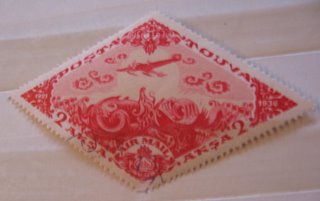
"I used to get those bargain packages of stamps," Tine said, "and it looks like I got swindled because there was a Tuvan stamp in the bunch. But look, here it is!"
Rubob was suitably amazed, Tine thought. "Perhaps Tuvan stamps are no longer so commonplace," she reflected.
Also in Tine's collection were pages of Queen Elizabeth stamps, sent to Tine by her grandmother.
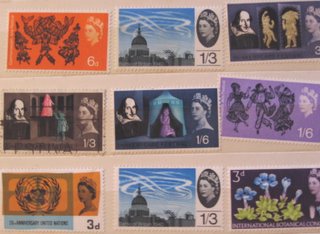
Mr. Derek wrote in his aerogram: "Shortly after the war, Australia issued a stamp simply captioned 'HRH Princess Elizabeth.' Buckingham Palace got itself in an uproar, insisting it be reissued with the modified title 'HRH The Princess Elizabeth.' Goes to show, like - as they say in Chester. Yers, yers, yers."

1947 Princess Elizabeth stamp.
Tine, who was suddenly consumed with stamps -- for the first time in many years -- pointed out to Rubob the picture of Shakespeare among the Queen Elizabeth stamps in her album.

"There's a story in today's Guardian saying that the 'Chandos portrait' is the 'only true painting' of Shakespeare," she said.
But Rubob had gone back to his newspaper, and he didn't look up. He was absorbed in the urgent matters of the world, which were beginning to intrude on Tine and Rubob's village, it seemed.
News stories had been reporting for a week that a Dubai-owned company planned to take control of more than 20 U.S. ports. Now, a front-page story in the local paper said, another conglomerate from Dubai was buying an aerospace plant in town, improbably enough. And what's more, the company was also taking over a metal-casting firm in the shoreline town where Tine and Rubob kept their doughty little sailboat, Puffin. Dubai may in fact have been infiltrated by al Qaeda, some reports said, and there was an outcry by those who said America's security might be compromised.
"Infiltrated," Tine said. "We'll have terrorists living right next door to us -- al Qaeda operatives in the village -- barbarians at the gate, Rubob."
"It's just a lot of hype -- that's what the story is, a lot of hoopla," Rubob said. "Xenophobia -- that's what it amounts to."

Chandos portrait, National Portrait Gallery
"But getting back to the Shakespeare story in the Guardian, I'm trying to tell you about that," Tine said. "The painting at the National Portrait Gallery in London might just be the one true portrait."
"More hype," Rubob said grumpily.
"Here's something else from the Portrait Gallery's Web site," Tine said: "Who died on this day in 1797, at the ripe old age of 80?"
"I have no idea," Rubob said.
"Horace Walpole," Tine replied. "That's where we'll go for our walk today, to the Lewis Walpole Library."
From all this, it's easy to see how walks take shape in Tine's mind. In this case, it all began with a Tuvan postage stamp. Tine's thoughts, it would appear, can get a lot of mileage out of 2-aksa Tuvan postage stamp. Two aksas -- the equivalent of 200 kopeks -- was enough to whisk her in a moment from Tuva to Canada, then on to England, down to Australia, back to London for a quick visit to the National Portrait Gallery, back home for an encounter with terrorists, and now, apparently, to the doorstep of the Lewis Walpole Gallery.
Horace Walpole -- Lewis will be introduced presently -- was the 4th Earl of Orford and the son of Prime Minister Robert Walpole. He lived in his "little Gothic castle," Strawberry Hill, in Twickenham, England. He was an art collector, antiquarian and writer, known for his Gothic novel, "The Castle of Otranto," and his prolific letter-writing. He'd written: "The whole secret of life is to be interested in one thing profoundly and in a thousand things well."
And that's where the Lewis in the library's name comes in: Wilmarth Sheldon Lewis -- known as "Lefty" to his friends -- was profoundly interested in Walpole and knowledgeable about a thousand other things. After graduating from Yale University, Lewis devoted his life to collecting the books, manuscripts, letters and artwork of Walpole -- in short, "Walpoliana." He lived on the main thoroughfare in Tine and Rubob's village, and his home is now a museum and library.
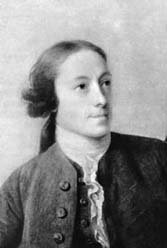
Horace Walpole, painted by Alan Ramsay.
"Are you ready for a quick walk in honor of Walpole?" Tine asked Rubob.
"The library's closed for renovations," Rubob said, rooted in his chair, "and even when it's open, it's only open to guests twice a year."
"I know that," Tine said. "We had cookies there after the tour. But I'd like to just walk to there, to give my regards."
"Cookies?" Rubob said, showing some interest.
"Yes, Pepperidge Farm cookies," Tine said -- "orange milanos, chocolate-chips with hazelnuts, vanilla creams and others, too. You must remember the cookies. I don't think we left enough for the next tour group. The man in charge of buildings and grounds -- and in charge of the cookies that day -- was keeping an eye on us. We were eating all the cookies he provided -- silver platters full of them. It was embarrassing, but it couldn't be helped. It was a long tour."
"All right, Tine -- we'll have a look, but there won't be any cookies today," Rubob said, with a note of disappointment.
It had been snowing all morning, and Tine and Rubob left fresh tracks in the snow as they made their way down the driveway.
As they turned down Hatter's Lane, Tine observed that the only sign of spring was an profusion of flowers that appeared to be looking out a bow window.

"Look, Rubob, we could stop for a pint," Tine said as they passed a window with a neon "Pabst Blue Ribbon Beer" sign in it.

"It's getting on lunchtime," she said. "It'd be like meeting Mr. Derek for a pint of Tetley's ale at the Duke of York in Yorkville."
"Pabst -- that used to be one of the cheapest beers around," Rubob said. "Pabst, Miller, Old Milwaukee -- they were sponsors of the Minnesota Twins' radio broadcast. Hamm's, too -- that was one of the sponsoring breweries back then."
"Hamm's? I've never heard of it," Tine said.

"'From the land of sky blue waters, from the land of pines, lofty balsam, comes the beer refreshing,'" Rubob sang. "Hamm's the Beer Refreshing."
"Well, that's a rather nice jingle, isn't it?" Tine said. "You must have listened to a heck of a lot of ball games."

"Well, you know how Dave loves fishing," Rubob said. "He constantly wanted me to go out on the lake with him in the Alumnacraft -- a 16-footer. It was boring, and I'd take the radio with me. That was the only thing that made it bearable, listening to the games. There was nothing else to do."
"It reminds me of the old coot who used to sit on his doorstep on High Street, holding a transistor radio to his ear, listening to the games," Tine said. "We passed him on our walks. He's gone now. I wonder what became of him. His house is being torn apart and rebuilt. Another 'historic renovation,' as the sign says, Rubob -- or more likely, as you like to say, another historic desecration."
"I wonder whether the Lewis Walpole renovation will be another historic desecration, Tine," Rubob said. He often joked about the approval process of the historic district commission, which seemed to approve every new homeowner's project to expand the historic houses in the village.
"A proposal to tear down the Lewis Walpole Library and replace it with a Wal-Mart: approved," Rubob said.
"They should open a pub at the Lewis Walpole Library," Tine said. "That'd draw a nice crowd. I'm sure the commission would approve it. A plan to convert the museum into a tavern: 'Nuff said, approved."
"The house across the street from the library, opposite Meadow Road, that was once a tavern," Rubob said. "Maybe the area's zoned for taverns."
The two reached the main thoroughfare at the bottom of Hatter's Lane, and Rubob stopped to look at one of the old hatter's cottages. He tilted his head and said, "I've never noticed this before, but isn't the upper window of that cottage crooked? In fact, the whole upper triangle looks crooked."

"It's the whole house that's leaning, I think," Tine said. "It's the crooked hatter's cottage."
"There was a crooked hatter and he walked a crooked mile,
He found a crooked sixpence upon a crooked stile.
He bought a crooked cat, which caught a crooked mouse.
And they all lived together in a little crooked house."
Farther down the main thoroughfare, Rubob said, "That house seems very out of season with the wreaths and all."

Tine stopped to look at Julia's house, Oldgate.

"There's something odd there, too," Rubob said. "Look, isn't the gate gone?"

"It's true, Rubob -- it does appear to be missing," Tine said. "What could have happened to it?"
The gate is always left open, as a sign of hospitality, but now it seemed to have vanished. Tine and Rubob had passed it on the way to Litchfield last Sunday, and they'd seen it on their misty walk in January.
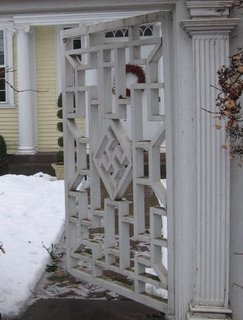
"The symbol on the gate, the missing gate, appears to resemble the Nazi swastika, but it's not in fact the same," Tine said, adopting Churchill's pronunciation of "Naazi" for Rubob's benefit. "It was copied two centuries ago from the Watergate by the Thames River in London. It's an Oriental symbol meaning peace and prosperity."
"Where'd you read about that, Tine?" Rubob asked.
"Maybe in one of Ernest Shaw's books," Tine said. "I hope the gate hasn't been carried off in the night. There's a fine line between being welcoming and being secure, isn't there, Rubob?"
"They're probably just repairing it," Rubob said.
"Or it was acquired by an Dubai antiques company," Tine speculated, seeing if she could get Rubob worked up over the topic again. "A proposal to sell the front gate at Oldgate to Dubai International Capital: approved."
"Symbols of our security, sold to the United Arab Emirates," Tine continued. "Stop the presses, Rubob. It's a bulletin! Nothing's secure in this world any longer -- not even the village gates. We're not safe in our homes."

Dubai aerogram. Photo from:
http://friends.peoria.lib.il.us/community/howardcourtney/dubai.html
"A lot of hooey -- and hysteria," Rubob said. "That whole Dubai story is much ado about nothing! And it's a done deal, anyway."
Tine chuckled to herself, while Rubob fumed.
The two passed the old tavern that Rubob had mentioned at the start of the walk.

"I could use a pint, Rubob," Tine said. "It's a bit of an old shock seeing the gate gone at Oldgate. But maybe it's just being repaired."
Rubob didn't respond; he was absorbed, no doubt, in the news of the day again.
"Why are you so quiet?" Tine asked.
"What? I can't hear you over all this noise," Rubob said as a group of trucks rumbled by on the main thoroughfare. "It shows what a racket the 21st century is -- a 'devilish din.' On our way to the Lewis house, we should be hearing the clip-clop of horses. But now all we hear is the roar of diesels. 'Shame, really,' as Mr. Derek would say."
"The simpler times of yesteryear," Tine said.
They crossed the busy thoroughfare and stood before the Lewis Walpole Library.

A sign out front confirmed that the museum was closed for renovations -- another "historic desecration."
Tine and Rubob wouldn't get a view inside the house today, though they had seen the Walpole library twice during tours.

"At least Mr. Lewis could retire to the back of the house to surround himself with Walpoliana," Rubob said.

"But of course it wasn't just Walpole stuff he collected; he had an absorbing interest in 18th-century England," Rubob added.

"What would you collect if you were a collector?" Tine asked as they turned back toward home. It would be only a short walk today, because Rubob had business in the world at large.
"I just don't know," Rubob said. "It'd have to be something English, of course."
"Yes, it would be, wouldn't it?" Tine said.

"What about you, Tine? But you're already something of a junk collector, aren't you?" Rubob said with a chuckle.
"Stamps from Tuva," Tine replied, unruffled by Rubob's remark. "I only have one, and I feel a desire for more. I'll order a bargain pack without 'No Tannu-Tuva' on the bag. But I tend to get swindled in stamp collecting. I've told you about how I traded my John Glenn Mercury space capsule block to a Russian fifth-grader for one measly Sputnik stamp. It turned out to be ripped, and I tore it up in a temper tantrum."
"Here's a better idea," Tine said: "I'll collect beer bottles from the Speckled Hen in Norfolk. I could imagine myself becoming profoundly interested in beer bottles. I've already started the collection, with Monty Python's Holy Grail Ale, Chimay Ale from the Trappists, and Dirty Dick's."

"At least you'd be limited to 150 bottles," Rubob said. "That's how many kinds of beer they say they have there. It'd be one of your smaller collections of junk -- a sub-collection, a containable one."
"You're a bit grouchy today," Tine said. "You need a Tetley's ale to cheer you up, I think."
"Preoccupied maybe," Rubob allowed.
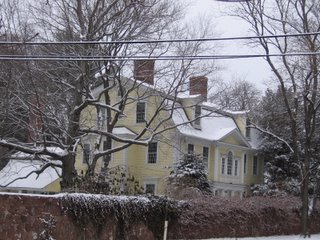
The two walked through the snow on an unplowed sidewalk, and Tine said, "Scofflaws. They haven't done their civic duty."

Rubob didn't reply, though failure to shovel sidewalks was something that could get him riled up -- when he wasn't consumed with the affairs of the wider world.
"We're like Franklin searching for the Northwest Passage," Tine said, thinking that might whet Rubob's interest. He'd watched a "Nova" program about Franklin a few nights ago.
"Franklin hoped to be stuck on the ice at least one winter, because he thought it would be a grand adventure," Rubob said. "As it turned out, their ships, the HMS Erebus and HMS Terror, were locked in the ice for two winters -- long enough for their tins of canned food to become contaminated with lead. They abandoned ship and set off across the ice, dragging a boat filled with the poisoned food and silver dinner services. "
"Of course they would have silver dinner dishes, wouldn't they?" Tine said. "Yers, yers, yers."
"They should have carried packages of freeze-dried meals," Rubob said. "But their food probably was freeze-dried after all."
"The frozen cans?" Tine asked, though she sensed where Rubob's story was leading.
"That, too," Rubob said. "But the lead poisoning drove them mad. There's some evidence of cannibalism."
"Rather nasty -- all very macabre, in fact," Tine said, "but a proper English story nonetheless. At least they remained civilized in the midst of it all, with the silver dinner services. They succeeded in keeping barbarism at bay, didn't they?"
"That they did, Tine," Rubob replied.
As they turned up Hatter's Lane, Tine stopped to examine a rock that had fallen from a stone wall.
"Come along," Rubob said.

"It'd be a good stone to take home for our walls, but I wouldn't dare," Tine said. "Highway robbery, you know."
Tine was, in fact, a collector of stones for her garden's walls, but she sternly suppressed the urge to carry this one home.
"London Bridge is falling down," Rubob said, looking at the stone. He was referring to "Heavy Words Lightly Thrown; The Reason Behind the Rhyme," a book he'd found at the library. The author, Chris Roberts, tells the "seamy and quirky stories behind favorite nursery rhymes."
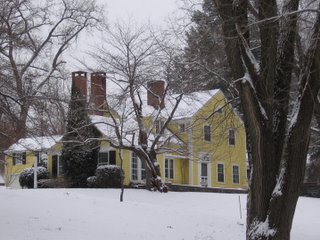
"What was the story behind 'London Bridge'?" Tine asked.
"Something about its being based on a Norwegian poem," Rubob said. "Roberts writes in such an elliptical style. It's not at all straightforward; in fact, it's almost serpentine."
"I've noticed," Tine said. "I've opened the book a few times, but I can't seem to get into it."
"Well, the idea of the London Bridge rhyme is that it's a celebration of the new bridge -- new when the rhyme was written, in the 13th century -- and a lament on the failure of the previous ones. Those bridges were all short-lived, carried away by the tide. He writes, too, about the bridge built by John Rennie in the 1800s, which started to fall apart, too. It was packed up and shipped to a park in Arizona, where it stands now, spanning a man-made lake."
"You'd like the stuff about the history of the earlier bridges because it involves human sacrifices," Rubob said.
"Yes, I would, wouldn't I?" Tine said.
"In olden times, they sometimes sacrificed children to appease the river deities and ensure that the bridges would be safe," Rubob said. "Funnily enough, a child's body was found floating near Tower Bridge in 2001, and police said a boy had been used as part of a cult's ceremony to bring good fortune to a business."
"A gruesome tale, Rubob," Tine said. "I don't know why the company didn't simply use the symbol on the Watergate by the Thames. That would have brought prosperity."
"The Watergate?" Rubob asked.
"The symbol on the gate, the missing gate, at Oldgate -- you remember," Tine said.
"Talk about serpentine," Rubob said. "I can't follow your ramblings at all."
Rubob fell into his own thoughts once again.
"Dubai again?" Tine asked.
"I'm thinking about what new things they'll come up with today to hype the story even more," Rubob said.
"Middle Eastern magnates are coming to our town," Tine said. "It's like Edgar Møller's movie, 'The Sheik of Iowa' in Garrison Keillor's 'Praire Home Companion,' only in this case it's 'The Sheiks of Farmington Village.'"

"A lot of hooey," Rubob said. "Hype -- blown out of all proportion. The talking heads have hijacked the story."
"So the village will remain the same, you think, Rubob, even with a Dubai company moving in? We'll keep barbarism at bay?"

"I think so, Tine," Rubob said.
As the two rounded the corner and approached home, Tine thought, "All in all, a very pleasant walk."

"Look, Tine, mail from Derek," Rubob said.
"Mr. Derek," Tine reminded Rubob. "He's quite particular about the 'Mr.'"
"Of course he would be, wouldn't he?" Rubob said, using a favorite expression of Mr. Derek's.
Mr. Derek, after reading in "Tine and Rubob's Pilgrimage" about the triangular stamps from Tannu-Tuva, wrote to Tine that such stamps were so commonplace in his early collecting days that "bargain packages, 500 different" were often advertised as having "no Tannu-Tuva."
This prompted Tine to search for her stamp book, which she dug out from the back of a closet.
"I've never seen that before," Rubob said.
"It's from third grade. I haven't opened it in years," Tine said.
Tine leafed through the fragile, discolored pages, and remarkably enough, she found one stamp from "Touva," as postal authorities insisted on spelling it. ("And we don't need the durn foreign spellings," Tine's grandfather might have said.)

"I used to get those bargain packages of stamps," Tine said, "and it looks like I got swindled because there was a Tuvan stamp in the bunch. But look, here it is!"
Rubob was suitably amazed, Tine thought. "Perhaps Tuvan stamps are no longer so commonplace," she reflected.
Also in Tine's collection were pages of Queen Elizabeth stamps, sent to Tine by her grandmother.

Mr. Derek wrote in his aerogram: "Shortly after the war, Australia issued a stamp simply captioned 'HRH Princess Elizabeth.' Buckingham Palace got itself in an uproar, insisting it be reissued with the modified title 'HRH The Princess Elizabeth.' Goes to show, like - as they say in Chester. Yers, yers, yers."

1947 Princess Elizabeth stamp.
Tine, who was suddenly consumed with stamps -- for the first time in many years -- pointed out to Rubob the picture of Shakespeare among the Queen Elizabeth stamps in her album.

"There's a story in today's Guardian saying that the 'Chandos portrait' is the 'only true painting' of Shakespeare," she said.
But Rubob had gone back to his newspaper, and he didn't look up. He was absorbed in the urgent matters of the world, which were beginning to intrude on Tine and Rubob's village, it seemed.
News stories had been reporting for a week that a Dubai-owned company planned to take control of more than 20 U.S. ports. Now, a front-page story in the local paper said, another conglomerate from Dubai was buying an aerospace plant in town, improbably enough. And what's more, the company was also taking over a metal-casting firm in the shoreline town where Tine and Rubob kept their doughty little sailboat, Puffin. Dubai may in fact have been infiltrated by al Qaeda, some reports said, and there was an outcry by those who said America's security might be compromised.
"Infiltrated," Tine said. "We'll have terrorists living right next door to us -- al Qaeda operatives in the village -- barbarians at the gate, Rubob."
"It's just a lot of hype -- that's what the story is, a lot of hoopla," Rubob said. "Xenophobia -- that's what it amounts to."

Chandos portrait, National Portrait Gallery
"But getting back to the Shakespeare story in the Guardian, I'm trying to tell you about that," Tine said. "The painting at the National Portrait Gallery in London might just be the one true portrait."
"More hype," Rubob said grumpily.
"Here's something else from the Portrait Gallery's Web site," Tine said: "Who died on this day in 1797, at the ripe old age of 80?"
"I have no idea," Rubob said.
"Horace Walpole," Tine replied. "That's where we'll go for our walk today, to the Lewis Walpole Library."
From all this, it's easy to see how walks take shape in Tine's mind. In this case, it all began with a Tuvan postage stamp. Tine's thoughts, it would appear, can get a lot of mileage out of 2-aksa Tuvan postage stamp. Two aksas -- the equivalent of 200 kopeks -- was enough to whisk her in a moment from Tuva to Canada, then on to England, down to Australia, back to London for a quick visit to the National Portrait Gallery, back home for an encounter with terrorists, and now, apparently, to the doorstep of the Lewis Walpole Gallery.
Horace Walpole -- Lewis will be introduced presently -- was the 4th Earl of Orford and the son of Prime Minister Robert Walpole. He lived in his "little Gothic castle," Strawberry Hill, in Twickenham, England. He was an art collector, antiquarian and writer, known for his Gothic novel, "The Castle of Otranto," and his prolific letter-writing. He'd written: "The whole secret of life is to be interested in one thing profoundly and in a thousand things well."
And that's where the Lewis in the library's name comes in: Wilmarth Sheldon Lewis -- known as "Lefty" to his friends -- was profoundly interested in Walpole and knowledgeable about a thousand other things. After graduating from Yale University, Lewis devoted his life to collecting the books, manuscripts, letters and artwork of Walpole -- in short, "Walpoliana." He lived on the main thoroughfare in Tine and Rubob's village, and his home is now a museum and library.

Horace Walpole, painted by Alan Ramsay.
"Are you ready for a quick walk in honor of Walpole?" Tine asked Rubob.
"The library's closed for renovations," Rubob said, rooted in his chair, "and even when it's open, it's only open to guests twice a year."
"I know that," Tine said. "We had cookies there after the tour. But I'd like to just walk to there, to give my regards."
"Cookies?" Rubob said, showing some interest.
"Yes, Pepperidge Farm cookies," Tine said -- "orange milanos, chocolate-chips with hazelnuts, vanilla creams and others, too. You must remember the cookies. I don't think we left enough for the next tour group. The man in charge of buildings and grounds -- and in charge of the cookies that day -- was keeping an eye on us. We were eating all the cookies he provided -- silver platters full of them. It was embarrassing, but it couldn't be helped. It was a long tour."
"All right, Tine -- we'll have a look, but there won't be any cookies today," Rubob said, with a note of disappointment.
It had been snowing all morning, and Tine and Rubob left fresh tracks in the snow as they made their way down the driveway.
As they turned down Hatter's Lane, Tine observed that the only sign of spring was an profusion of flowers that appeared to be looking out a bow window.

"Look, Rubob, we could stop for a pint," Tine said as they passed a window with a neon "Pabst Blue Ribbon Beer" sign in it.

"It's getting on lunchtime," she said. "It'd be like meeting Mr. Derek for a pint of Tetley's ale at the Duke of York in Yorkville."
"Pabst -- that used to be one of the cheapest beers around," Rubob said. "Pabst, Miller, Old Milwaukee -- they were sponsors of the Minnesota Twins' radio broadcast. Hamm's, too -- that was one of the sponsoring breweries back then."
"Hamm's? I've never heard of it," Tine said.

"'From the land of sky blue waters, from the land of pines, lofty balsam, comes the beer refreshing,'" Rubob sang. "Hamm's the Beer Refreshing."
"Well, that's a rather nice jingle, isn't it?" Tine said. "You must have listened to a heck of a lot of ball games."

"Well, you know how Dave loves fishing," Rubob said. "He constantly wanted me to go out on the lake with him in the Alumnacraft -- a 16-footer. It was boring, and I'd take the radio with me. That was the only thing that made it bearable, listening to the games. There was nothing else to do."
"It reminds me of the old coot who used to sit on his doorstep on High Street, holding a transistor radio to his ear, listening to the games," Tine said. "We passed him on our walks. He's gone now. I wonder what became of him. His house is being torn apart and rebuilt. Another 'historic renovation,' as the sign says, Rubob -- or more likely, as you like to say, another historic desecration."
"I wonder whether the Lewis Walpole renovation will be another historic desecration, Tine," Rubob said. He often joked about the approval process of the historic district commission, which seemed to approve every new homeowner's project to expand the historic houses in the village.
"A proposal to tear down the Lewis Walpole Library and replace it with a Wal-Mart: approved," Rubob said.
"They should open a pub at the Lewis Walpole Library," Tine said. "That'd draw a nice crowd. I'm sure the commission would approve it. A plan to convert the museum into a tavern: 'Nuff said, approved."
"The house across the street from the library, opposite Meadow Road, that was once a tavern," Rubob said. "Maybe the area's zoned for taverns."
The two reached the main thoroughfare at the bottom of Hatter's Lane, and Rubob stopped to look at one of the old hatter's cottages. He tilted his head and said, "I've never noticed this before, but isn't the upper window of that cottage crooked? In fact, the whole upper triangle looks crooked."

"It's the whole house that's leaning, I think," Tine said. "It's the crooked hatter's cottage."
"There was a crooked hatter and he walked a crooked mile,
He found a crooked sixpence upon a crooked stile.
He bought a crooked cat, which caught a crooked mouse.
And they all lived together in a little crooked house."
Farther down the main thoroughfare, Rubob said, "That house seems very out of season with the wreaths and all."

Tine stopped to look at Julia's house, Oldgate.

"There's something odd there, too," Rubob said. "Look, isn't the gate gone?"

"It's true, Rubob -- it does appear to be missing," Tine said. "What could have happened to it?"
The gate is always left open, as a sign of hospitality, but now it seemed to have vanished. Tine and Rubob had passed it on the way to Litchfield last Sunday, and they'd seen it on their misty walk in January.

"The symbol on the gate, the missing gate, appears to resemble the Nazi swastika, but it's not in fact the same," Tine said, adopting Churchill's pronunciation of "Naazi" for Rubob's benefit. "It was copied two centuries ago from the Watergate by the Thames River in London. It's an Oriental symbol meaning peace and prosperity."
"Where'd you read about that, Tine?" Rubob asked.
"Maybe in one of Ernest Shaw's books," Tine said. "I hope the gate hasn't been carried off in the night. There's a fine line between being welcoming and being secure, isn't there, Rubob?"
"They're probably just repairing it," Rubob said.
"Or it was acquired by an Dubai antiques company," Tine speculated, seeing if she could get Rubob worked up over the topic again. "A proposal to sell the front gate at Oldgate to Dubai International Capital: approved."
"Symbols of our security, sold to the United Arab Emirates," Tine continued. "Stop the presses, Rubob. It's a bulletin! Nothing's secure in this world any longer -- not even the village gates. We're not safe in our homes."

Dubai aerogram. Photo from:
http://friends.peoria.lib.il.us/community/howardcourtney/dubai.html
"A lot of hooey -- and hysteria," Rubob said. "That whole Dubai story is much ado about nothing! And it's a done deal, anyway."
Tine chuckled to herself, while Rubob fumed.
The two passed the old tavern that Rubob had mentioned at the start of the walk.

"I could use a pint, Rubob," Tine said. "It's a bit of an old shock seeing the gate gone at Oldgate. But maybe it's just being repaired."
Rubob didn't respond; he was absorbed, no doubt, in the news of the day again.
"Why are you so quiet?" Tine asked.
"What? I can't hear you over all this noise," Rubob said as a group of trucks rumbled by on the main thoroughfare. "It shows what a racket the 21st century is -- a 'devilish din.' On our way to the Lewis house, we should be hearing the clip-clop of horses. But now all we hear is the roar of diesels. 'Shame, really,' as Mr. Derek would say."
"The simpler times of yesteryear," Tine said.
They crossed the busy thoroughfare and stood before the Lewis Walpole Library.

A sign out front confirmed that the museum was closed for renovations -- another "historic desecration."
Tine and Rubob wouldn't get a view inside the house today, though they had seen the Walpole library twice during tours.

"At least Mr. Lewis could retire to the back of the house to surround himself with Walpoliana," Rubob said.

"But of course it wasn't just Walpole stuff he collected; he had an absorbing interest in 18th-century England," Rubob added.

"What would you collect if you were a collector?" Tine asked as they turned back toward home. It would be only a short walk today, because Rubob had business in the world at large.
"I just don't know," Rubob said. "It'd have to be something English, of course."
"Yes, it would be, wouldn't it?" Tine said.

"What about you, Tine? But you're already something of a junk collector, aren't you?" Rubob said with a chuckle.
"Stamps from Tuva," Tine replied, unruffled by Rubob's remark. "I only have one, and I feel a desire for more. I'll order a bargain pack without 'No Tannu-Tuva' on the bag. But I tend to get swindled in stamp collecting. I've told you about how I traded my John Glenn Mercury space capsule block to a Russian fifth-grader for one measly Sputnik stamp. It turned out to be ripped, and I tore it up in a temper tantrum."
"Here's a better idea," Tine said: "I'll collect beer bottles from the Speckled Hen in Norfolk. I could imagine myself becoming profoundly interested in beer bottles. I've already started the collection, with Monty Python's Holy Grail Ale, Chimay Ale from the Trappists, and Dirty Dick's."

"At least you'd be limited to 150 bottles," Rubob said. "That's how many kinds of beer they say they have there. It'd be one of your smaller collections of junk -- a sub-collection, a containable one."
"You're a bit grouchy today," Tine said. "You need a Tetley's ale to cheer you up, I think."
"Preoccupied maybe," Rubob allowed.

The two walked through the snow on an unplowed sidewalk, and Tine said, "Scofflaws. They haven't done their civic duty."

Rubob didn't reply, though failure to shovel sidewalks was something that could get him riled up -- when he wasn't consumed with the affairs of the wider world.
"We're like Franklin searching for the Northwest Passage," Tine said, thinking that might whet Rubob's interest. He'd watched a "Nova" program about Franklin a few nights ago.
"Franklin hoped to be stuck on the ice at least one winter, because he thought it would be a grand adventure," Rubob said. "As it turned out, their ships, the HMS Erebus and HMS Terror, were locked in the ice for two winters -- long enough for their tins of canned food to become contaminated with lead. They abandoned ship and set off across the ice, dragging a boat filled with the poisoned food and silver dinner services. "
"Of course they would have silver dinner dishes, wouldn't they?" Tine said. "Yers, yers, yers."
"They should have carried packages of freeze-dried meals," Rubob said. "But their food probably was freeze-dried after all."
"The frozen cans?" Tine asked, though she sensed where Rubob's story was leading.
"That, too," Rubob said. "But the lead poisoning drove them mad. There's some evidence of cannibalism."
"Rather nasty -- all very macabre, in fact," Tine said, "but a proper English story nonetheless. At least they remained civilized in the midst of it all, with the silver dinner services. They succeeded in keeping barbarism at bay, didn't they?"
"That they did, Tine," Rubob replied.
As they turned up Hatter's Lane, Tine stopped to examine a rock that had fallen from a stone wall.
"Come along," Rubob said.

"It'd be a good stone to take home for our walls, but I wouldn't dare," Tine said. "Highway robbery, you know."
Tine was, in fact, a collector of stones for her garden's walls, but she sternly suppressed the urge to carry this one home.
"London Bridge is falling down," Rubob said, looking at the stone. He was referring to "Heavy Words Lightly Thrown; The Reason Behind the Rhyme," a book he'd found at the library. The author, Chris Roberts, tells the "seamy and quirky stories behind favorite nursery rhymes."

"What was the story behind 'London Bridge'?" Tine asked.
"Something about its being based on a Norwegian poem," Rubob said. "Roberts writes in such an elliptical style. It's not at all straightforward; in fact, it's almost serpentine."
"I've noticed," Tine said. "I've opened the book a few times, but I can't seem to get into it."
"Well, the idea of the London Bridge rhyme is that it's a celebration of the new bridge -- new when the rhyme was written, in the 13th century -- and a lament on the failure of the previous ones. Those bridges were all short-lived, carried away by the tide. He writes, too, about the bridge built by John Rennie in the 1800s, which started to fall apart, too. It was packed up and shipped to a park in Arizona, where it stands now, spanning a man-made lake."
"You'd like the stuff about the history of the earlier bridges because it involves human sacrifices," Rubob said.
"Yes, I would, wouldn't I?" Tine said.
"In olden times, they sometimes sacrificed children to appease the river deities and ensure that the bridges would be safe," Rubob said. "Funnily enough, a child's body was found floating near Tower Bridge in 2001, and police said a boy had been used as part of a cult's ceremony to bring good fortune to a business."
"A gruesome tale, Rubob," Tine said. "I don't know why the company didn't simply use the symbol on the Watergate by the Thames. That would have brought prosperity."
"The Watergate?" Rubob asked.
"The symbol on the gate, the missing gate, at Oldgate -- you remember," Tine said.
"Talk about serpentine," Rubob said. "I can't follow your ramblings at all."
Rubob fell into his own thoughts once again.
"Dubai again?" Tine asked.
"I'm thinking about what new things they'll come up with today to hype the story even more," Rubob said.
"Middle Eastern magnates are coming to our town," Tine said. "It's like Edgar Møller's movie, 'The Sheik of Iowa' in Garrison Keillor's 'Praire Home Companion,' only in this case it's 'The Sheiks of Farmington Village.'"

"A lot of hooey," Rubob said. "Hype -- blown out of all proportion. The talking heads have hijacked the story."
"So the village will remain the same, you think, Rubob, even with a Dubai company moving in? We'll keep barbarism at bay?"

"I think so, Tine," Rubob said.
As the two rounded the corner and approached home, Tine thought, "All in all, a very pleasant walk."




